Strike, coordination, and dismissal in uniform wage settings (updated January 2014)
DOI:
https://doi.org/10.24352/UB.OVGU-2018-510Keywords:
fair wage-effort hypothesis, efficiency wages, wage compression, labor unions, unemploymentAbstract
We study a gift exchange game with 12 employees and one employer. When the employer can offer individually differentiated wages in a setting without collective action, we observe high levels of wages, effort choices, and total earnings. When the employer is restricted to offering a uniform wage, trust and reciprocity drop dramatically due to widespread shirking. The stepwise introduction of two collective action mechanisms, strike and coordination, increases the employees’ share of the total earnings, but does not mitigate the free-riding problem. Adding employment risk to the collective action setup drives up wages, reduces free-riding, and leads to higher total earnings. However, this increase in productivity is not sufficient to achieve the high levels of wages, efforts and earnings that we observe with individually differentiated wages.


